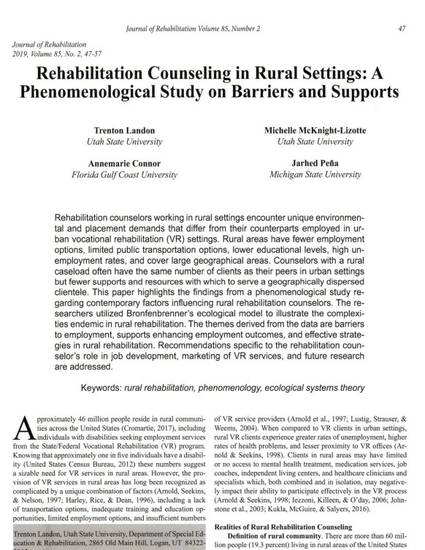
Article
Rehabilitation Counseling in Rural Settings: A Phenomenological Study on Barriers and Supports
Journal of Rehabilitation
(2019)
Abstract
Rehabilitation counselors working in rural settings encounter unique environmental and placement demands that differ from their counterparts employed in urban vocational rehabilitation (VR) settings. Rural areas have fewer employment options, limited public transportation options, lower educational levels, high unemployment rates, and cover large geographical areas. Counselors with a rural caseload often have the same number of clients as their peers in urban settings but fewer supports and resources with which to serve a geographically dispersed clientele. This paper highlights the findings from a phenomenological study regarding contemporary factors influencing rural rehabilitation counselors. The researchers utilized Bronfenbrenner’s ecological model to illustrate the complexities endemic in rural rehabilitation. The themes derived from the data are barriers to employment, supports enhancing employment outcomes, and effective strategies in rural rehabilitation. Recommendations specific to the rehabilitation counselor’s role in job development, marketing of VR services, and future research are addressed.
Keywords
- rural rehabilitation,
- phenomenology,
- ecological systems theory
Disciplines
Publication Date
Summer July 5, 2019
Citation Information
Trenton J. Landon, Michelle Lizotte, Annemarie Connor and Jarhed Pena. "Rehabilitation Counseling in Rural Settings: A Phenomenological Study on Barriers and Supports" Journal of Rehabilitation Vol. 85 Iss. 2 (2019) p. 47 - 57 Available at: http://works.bepress.com/michelle-lizotte/3/
